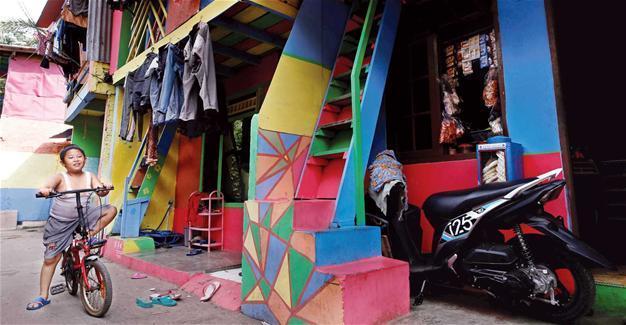Indonesians take tiny steps against tobacco
JAKARTA

A neighborhood in the Indonesian capital has informally declared itself a smoke-free zone as students plan further protests against what they see as an increased effort by cigarette companies to target the young.
Indonesia has one of the highest rates of smoking and is the world’s fourth-biggest cigarette producer, mostly of the pungent “kretek” clove and tobacco variety, but parliament has proposed a law to boost tobacco output further. A few groups are now pushing back against Big Tobacco in the country of 250 million people where nearly two-thirds of men smoke and a cigarette pack can cost less than $2.
In eastern Jakarta, a row of at least a dozen houses at the Penas Tanggul neighborhood were painted with bright colors in March, with a blue banner hung near the entrance declaring it a smoke-free zone. Residents there have been encouraged to stop or to avoid smoking “so this neighborhood will not just be beautiful, but also healthy”, said Nobby Sail Andi Supu, a 22-year-old student who coordinated the program with a civic group.
More than 200 people, mostly students, held a protest last month to oppose an upcoming industry exhibition of cigarettemaking machines in Jakarta and is planning another rally next week, said Manik Marganamahendra, one of the protest organizers. Cigarette companies are targeting young Indonesians with new products such as fruit-flavored cigarettes, as well as attractive packaging and advertisements, the 20-year-old Marganamahendra said. Despite health concerns, the tobacco industry is often defended in Indonesia by politicians and others as an important source of income for farmers and revenue for the government.
Indonesia produced 269.2 billion cigarettes in 2015, according to research firm Euromonitor International. The market was valued at 231.3 trillion rupiah ($17.3 billion) and growing fast.
 A neighborhood in the Indonesian capital has informally declared itself a smoke-free zone as students plan further protests against what they see as an increased effort by cigarette companies to target the young.
A neighborhood in the Indonesian capital has informally declared itself a smoke-free zone as students plan further protests against what they see as an increased effort by cigarette companies to target the young.